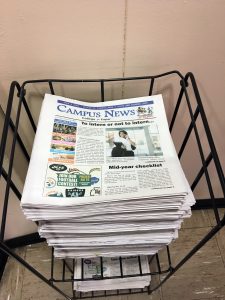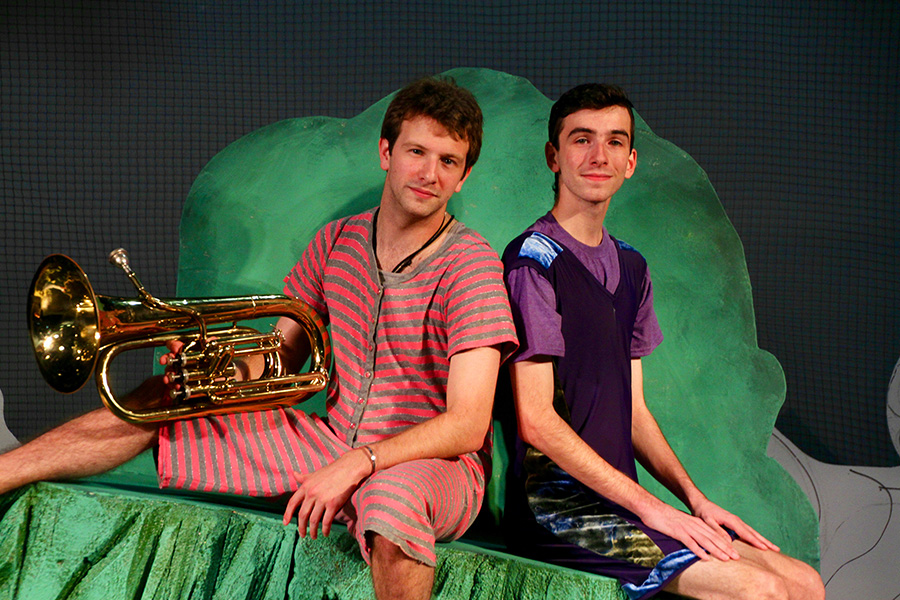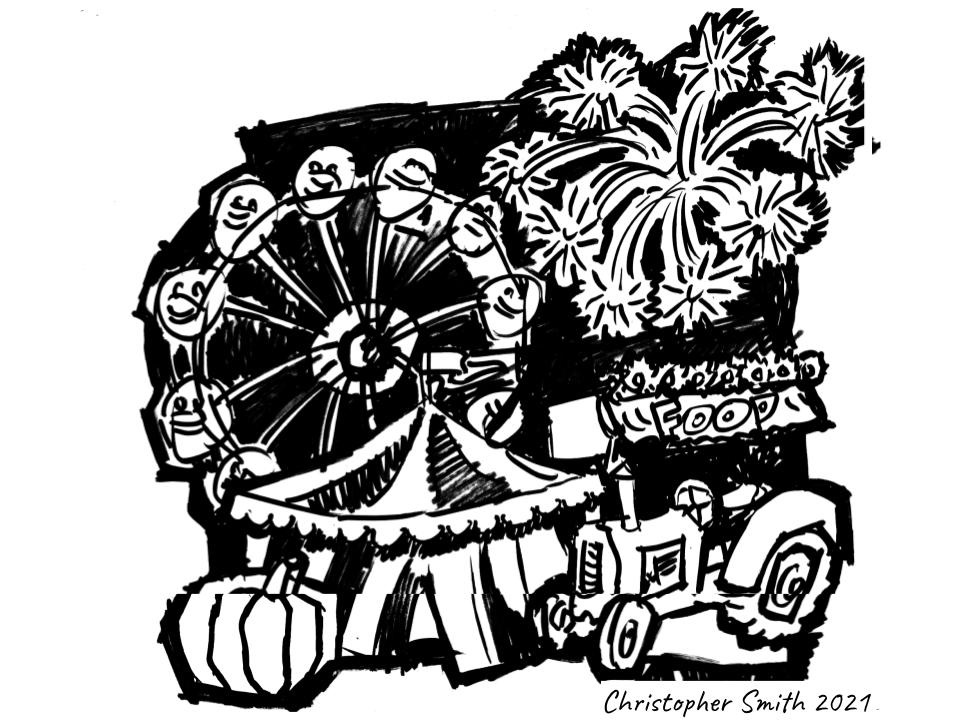Prof. Alan Williams
Special to Campus News
The passing of musician David Cassidy on Nov. 21 appears to have resonated for a far larger number of people than one might have expected, given that his last Top 40 chart appearance in the U.S. was more than 25 years ago. But for folks coming of age in the early 1970s, David Cassidy, and his alter-ego Keith Partridge on “The Partridge Family” – a sitcom about a fictitious family rock band, the Partridges – was the very model of a modern, major rock star. He looked good, he sounded good and he good naturedly suffered scripted jokes at his expense every week on national television.

Television, with its proven power to market pop music, was the raison d’être of “The Partridge Family,” and by extension Cassidy’s career. With the massive success of The Monkees – the pre-fab four whose records outsold The Beatles during their commercial peak years in the mid-1960s while starring in a TV show of the same name – the entertainment industry had found a way to reclaim their dominance over the popular music realm that had been completely upended by upstarts like The Beatles, Bob Dylan and the finely honed outlier machine that was Motown Records. Television made money from its sponsors. Musical acts on TV sold records to the millions of viewers who tuned in to variety shows like “The Ed Sullivan Show.” Songwriters earned decent money from record sales, but earned far more income from the negotiated royalties that came from network broadcasts. Record companies maximized their return on investment by hiring highly skilled professional musicians who could deliver gold-record performances at the rate of one hit single per hour (compare the time taken to record the entire Monkees catalog to that of the Beatles who spent more than 100 hours just crafting the album “Sgt. Pepper’s Lonely Hearts Club Band”). The Monkees pulled together all of these strands in a coordinated effort to keep middle-aged industry pros employed by tapping the piggy banks of young listeners not yet turned on and tuned out.
As a TV show, “The Partridge Family” was conceived to work in exactly the same manner as “The Monkees” – to sell records by these artists. Sometimes, both shows used the same songwriters and publishers and hired the famed L.A. session musicians referred to as “The Wrecking Crew” to record the pop hits featured on these broadcasts. It was crass commercialism without apology. But a funny thing happened on the way to the bank – David Cassidy, who sang lead on Partridge Family songs. The miracle of Cassidy was that for all of his good looks and comedic talent as an actor, he somehow managed to convey a sense of authenticity in his vocal performance, under the most contrived circumstances imaginable. And his ability to do so meant that millions of listeners not only tuned in weekly and bought the records according to plan, but developed a true bond with the performer.
I was one of those fans, and while the deaths of John Lennon, Marvin Gaye, David Bowie, Prince, and Tom Petty all impacted me predictably, I was somewhat taken aback at the sadness that overcame me with the news of Cassidy’s passing. Over the week since his death, in conversation with people in my age group, eventually the subject of Cassidy and the Partridge Family would come up, and in hushed tones, folks would reluctantly reveal that they had been big fans, and truly mourned the loss of someone they had not listened to in decades.
The guilty pleasure. The cognitive dissonance one feels when trying to reconcile an attraction to things that should not be attractive. Things one didn’t admit in public, but might secretly harbor an abiding love for. As an 8-year-old, I loved the Partridge Family without hesitation, without shame. But as my far older (three years) cousin mocked me mercilessly for my lowbrow tastes, I began to understand that there was good music and bad music, hip and unhip, cool and uncool. And David Cassidy was decidedly uncool. All of my cousin’s friends knew it. And all the critics that wrote for the magazines he and his friends read knew it. And sadly, it turns out, David Cassidy knew it too. That’s why he agreed to an interview with the then ultra-hip magazine Rolling Stone, and posed nude for the accompanying article – to prove that he knew his records were garbage, that his career was the result of big money pulling big strings. And gradually, his audience accepted this as truth and stopped listening.
But while the costumes and arrangements now look and sound as dated as one might expect, re-watching a “Partridge Family” episode demonstrates the near-magical power of Cassidy to transcend the prefabricated TV sets and scenarios. The records themselves make that even easier to experience – and why not? The same musicians played on the now revered Beach Boys album “Pet Sounds” and a host of classic pop Phil Spector productions. And acts like Miley Cyrus, Britney Spears, and Justin Timberlake, all children of the same type of TV-based “package” as Cassidy, are considered serious, worthwhile pop acts.
In the 1970s, having hits on the radio was a scarlet letter, proof of an inauthentic collaboration with the evil pop music industry. But in our current era, pop hits are legit. Taylor Swift, Adele, Beyoncé – pleasures without guilt. And had David Cassidy come on the scene as part of the Disney Channel empire of the 1990s, he might have actually become the serious artist he knew he could never pretend to be. And his fans would champion his music – their music – with the pride and joy of an innocent 8-year-old. Come on, get happy!
 Alan Williams is the chairman of the Department of Music at the University of Massachusetts Lowell, and records and performs with his band, Birdsong At Morning. He traded in his Partridge Family LPs back in middle school, but now owns the complete series on DVD.
Alan Williams is the chairman of the Department of Music at the University of Massachusetts Lowell, and records and performs with his band, Birdsong At Morning. He traded in his Partridge Family LPs back in middle school, but now owns the complete series on DVD.





Professor Williams-
I hope you don’t mind this long post to your essay on Mr. Cassidy. It stirred a few thoughts that I just wanted to share. We are likely in/around the same age (I’m 53 almost 54), so the Partridge Family, et al, are certainly in my wheelhouse.
I think this is a very cogent and well-stated essay on the dynamics of recognizing an awakening later in life, about a childhood joy that is abandoned, as most are, by a combination of personal growth and external influences (Puff the Magic Dragon, anyone?) – abandonment of one’s pleasure as a pre-teen almost always comes chiefly, by means of peers and elder family “statesmen” mostly whom are all of 2 or 3 years older (because the ones 6-7 years older wouldn’t talk to their 8 year old cousins after the first opening of the door at Thanksgiving or Christmas because they invariably would retreat to their rooms where teenaged angst back then was played out via Iron Butterfly and such other influences that that an 8 year old couldn’t fathom)- so those 10-11 and 12 year old cousins or perhaps kids of your parents friends who live across town and reluctantly have to come over once a year to watch the Super Bowl (and be nice to their little boy), all of whom know, oh!!, so much more than you do; these are usually the ones to serve as the mocking forces that dispel, by various forms of ridicule, your interests. Those rascally cousins who have already smoked a cigarette (later that joint), or swallowed that first beer (later that stolen 6-pack from the mini-mart), had that first French kiss (later that first experience of petting) behind the schoolyard- whereas you(I) – the younger are 2-3 years or so away from the first of those experiences.
You struck home with your description of these times and feelings. I can recall gathering with the neighborhood kids to play flashlight tag or some such game roaming the neighborhood backlots and “the woods” and so forth – but come Friday night somebody’s parents were having a boozed filled party and one of the other Mom’s would let the kids all clamber into her home to watch a few hours of ABC syrup from the Brady’s and Partridge family, the more risqué Room 222 and almost verboten Love American Style- all while the folks were 2 doors down, pounding bourbon and singing standards around a well-worn piano … and maybe passing a few keys around, who knows.
Your tribute to David Cassidy is so very well-reasoned – his vocals by any measure, were quite good and hold up by today’s standards. He turned that grind house, Brill Building type of sound into passionate, well-phrased and timed melodies that resonated- first with pre-teen girls- but as you listen between the grooves, his artistry truly emerges. “I’ll Meet You Halfway” is my favorite of these. His appeal may have been bubblegum, as the initial Monkees phenomena was (more on that coming) – but his ability to deliver powerful feelings in the songs he was given is undeniable. I wrote something on facebook when he died very similarly – which always gets a “like” from the old high school girls, but I was glad to see a somewhat kindred soul write something so well framed as your essay I stumbled onto today. (effective use of my post-holiday work hours)
In my 50’s, I have learned finally that I need not be ashamed for any of my so called “secret’ interests stashed from childhood – particularly when they come to music. Of Cassidy’s later career, I think it is a fairly said that he marched on- forever encased by a brief 4 year period of his life – after the initial rebelliousness of the Rolling Stone spread, and as his touring began to sour under its own weight of trauma at one venue, but then later- as he was still delivering syrup to a mid-70’s post-Vietnam American disillusionment, where it was banished to theme parks that were dealing on being retreats of “good clean family fun” and his music simply did not speak to the revolution in culture that was emerging on FM dials and soon enough alternative college stations and pubs in the big cities and back over in the UK – so there he was, a few failed TV series forays now past – back on the “horse” playing wherever his managers could book him – understanding he had to deliver the hits- while trying to bring in new things, mostly to no avail, but nonetheless trying to gain momentum to cheeringly nostalgic audiences that were only stopping by the carnival tent for a brief hour or two of escapism.
A reunion chat session on Good Morning America or Today aside, national notoriety and rehabilitated image as a mature artist with something new to give could simply never be afforded to him (and so many others), because the public would never allow it. (How he must have tried to latch on to Susan Dey when she reappeared on LA Law)… The irony being, as you so eloquently put it, that in today’s world, and I especially appreciate your citing of Timberlake, (Cassidy) certainly in today’s climate, could have found respect in his adult years on a different level. I think Rick Nelson – especially with the Stone Canyon band is another similar example- with the exception that Nelson, while not completely denying his past (he wrote his most famous song both recognizing and denying it), became an outstanding musician and songwriter and despite personal turmoil, he, to his death, was still progressing as a complete artist and refused to compromise on his direction – so sad he never got the respect beyond “Ozzie and Harriet” he deserved.
This brings me to your commentary on the Monkees. I am not sure how to interpret it – but I will agree that while they are the quintessential rock-band marketing ploy (and you describe that very succinctly and effectively), they are also forever cited in essay’s like these, covering well-trod ground of their “plasticity” – however, (yes, I am a Monkees “truther” apologies upfront) -the Paul Harvey “rest of the story” is not so digestible- because they not only moved from being cogs in the machine, but they took painstaking and personal risk to destroy the very machine they were encased in. Along the way they continued to produce some very valuable music that holds up with the best of the 60’s with few exceptions.
I never wavered in my appreciation for them – for example, I once met with and had a slight, shall we say, “flirtation” with a lass from the College of William and Mary – she was the star DJ on their alt rock station in the mid-80’s, spinning Husker Du and such to a rabid following – me, a military school cadet on my way to a 20+ career as an Army infantryman her opposite in so many ways- but a few sparks had flown, and so she invited me one night to come play my favorite tunes on her station- and of course, I brought the Monkees catalogue, chiefly “Head” and defied her (and her listeners) to name the group – but when I spun “Can You Dig it” they derided me for being some kind of 60’s wannabe and when I proclaimed these were the Monkees.. they literally stormed the station.. and such was both my budding romance and my DJ career derailed… as a coda to that story, like you today, I am a frontman for my own classic band of college buddies, a late in life gig where we can play any tune, from Monkees to Hendrix to early REM to Chicago blues, even some new stuff, with no remorse or concerns of ridicule!!
No, they didn’t perfect a song for 100 hours, but neither did McCartney play French horn on SGT Pepper’s, as Davy Jones so astutely said many years ago. The point being, for every bit as appreciated as we can make Cassidy’s unique talent and musical sensibilities in the most phony of environments, the same can be held, if not more so, that the Monkees overcame even more predisposed notions of falsehood, have aged mostly gracefully in so doing, and even provided us with in some cases better performances than their originals – underlying a true authenticity they always had (Nesmith always cited as the outlier, but I think its all of them- look at ol’ Peter Tork still playing with his Blue-Sued Shoes”), but alas, they have been denied by the cultural elites, as evidenced by their lack of inclusion the RR HoF as the most glaring and embarrassing example. Oh the guys know their formula, and they rode crests in the MTV-inspired 80’s resurgence and a flurry here or there since – but around the passing of Jones, the remaining three came to find a new means to respect their niche, re-interpret some of their hits in a classy way, tour on a intimate, but joyful level, produce an album supplemented by great songwriting in 2016 – all in such a way, that to end their story circa 1968 as a failed experiment, lacks context and truism.
So to close (I know, thank god!) – I am not criticizing what you wrote about them, but I do hope it was to serve the purpose of explaining Cassidy’s arc as an “disavowed” artist as opposed to labeling them as eternally phony. That said, with a post longer than your article, I offer my profound thanks to your tribute to David Cassidy and your description of those hidden pleasures of our youth’s that are wantonly abandoned for conformities’ sake (I once, to impress some new cooler “best” friends, in a new neighborhood, took all my Monkee, Partridge, even Tommy James and other type albums, and threw them out my upstairs window to my buddy in the street until we effectively smashed every one of them.. and of course, now I rue that day- but a stocky kid who sang in the school choir, a few years away from being a college athlete, had to have a means to fit in, and that act was my way of physically and metaphorically doing so)… Thank you Dr. Williams- You stirred that memory and more and I am grateful.
Nice piece. I suppose you could say I was a closet David Cassidy fan. I always digged “I Think I Love You.” He sang it with such conviction. I truly believed he woke up and realized he was in love. If he could pull that off, then that makes him a successful singer.